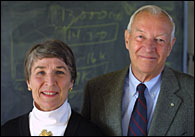Promoting professionalism
Around the world, medical practitioners feel they are forced to participate in the undermining of their own profession by seemingly uncontrollable forces.
 Dr. Sylvia Cruess and Dr. Richard Cruess
Dr. Sylvia Cruess and Dr. Richard CruessPHOTO: Owen Egan |
|
For example, some physicians find themselves skimping on diagnostic tests in order to save money for their commercially run healthcare institution. Others may be juggling too many patients at once for them to devote the proper attention required for each individual.
Since 1999, a group of approximately 20 health professionals from North America and Europe, including Dr. Richard Cruess from the Centre for Continuing Medical Education and Dr. Sylvia Cruess from the Centre for Medicine, Ethics and Law, have been working on the Medical Professionalism Project. The project, for which the Cruesses have acted as consultants, represents an attempt to place a new emphasis on some age-old philosophies of medicine.
The project is a collaboration of the American College of Physicians-American Society of Internal Medicine (API-ACIN), the American Board of Internal Medicine, and the European Federation of Internal Medicine, which governs the medical societies of over 25 countries.
The result of this work is the Charter on Medical Professionalism, which was simultaneously published in Annals of Internal Medicine and The Lancet in February, outlining three principles and 10 commitments on what being a medical professional entails.
"The charter is a public statement that this is what the medical profession believes it should stand for in a new and complicated society," says Richard Cruess, a former dean of medicine at McGill.
"On the one hand, the Hippocratic Oath is a public profession of a commitment. On the other hand, you have codes of ethics which are really guidelines for conduct, and they're based on experience and other basic ethical dilemmas that health care professionals face in their day-to-day lives.
"This really complements both. The reason for the charter is to try and help to preserve the value-laden medical profession that stands for the things that the charter outlines."
The charter asserts that the physician's primary duty is to the patient and that "market forces, societal pressures, and administrative exigencies must not compromise this principle."
In Canada, news reports are rife with stories of doctor and nurse shortages, of emergency room overcrowding, and of patients being prematurely released from hospital. A lack of sufficient funding for the system is often cited and governments tend to be fingered as the culprits.
As the first principle of the charter states, inadequate funding is no excuse for providing shoddy medical care.
Rather, says Sylvia Cruess, a former director of professional services at the Royal Victoria Hospital, the physician should aim to do the best job possible with the resources available. Nevertheless, "there is tremendous demoralization among health professionals who aren't doing the job they know they could do," she says.
That's a far cry from how medicine was practised only 50 years ago, which is about the time the Cruesses began their careers.
"In the 1950s, for example, medicine was a very small industry. Most doctors were free-standing practitioners, not working in groups, technology was in its infancy, there wasn't very much insurance."
"Antibiotics only came out in the '50s. All of a sudden we went from being a cottage industry to one which is now, in Canada, about 10 percent of a much larger GDP," says Richard Cruess. "Technology came and increased the cost, we're living longer, which means we'll use more healthcare as we get older, and all of a sudden life's very, very complicated."
One particularly complex issue, and one that seems to conflict with the charter's third principle, which states that "physicians must promote justice in the healthcare system, including the fair distribution of healthcare resources," is the issue of limited resources spread out over a larger population.
"For physicians in the Canadian system, the real tension is between obligations to the individual patient and obligations to society, to try and use the resources so that you can give the most care to the most people with this amount of resources," says Richard Cruess.
"We feel that the principal threat to values in medicine in the United States is the market place and that it is much more destructive to values than is a government."
The Charter on Medical Professionalism has been sent to most medical associations, schools and licensing bodies in the country on the suggestion that it be adopted in some sort of official capacity.
Presently, there are discussions underway with the American Board of Orthopaedic Surgery, which is groping with a way to evaluate ethics and professionalism in its certifying exams. It has been suggested to the board that the charter can be used as a reference document against which professional behaviour can be evaluated.
The Cruesses hope that McGill's Faculty of Medicine will adopt the charter in some official capacity before long.

